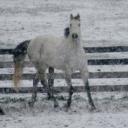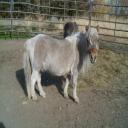Yahoo Answers is shutting down on May 4th, 2021 (Eastern Time) and beginning April 20th, 2021 (Eastern Time) the Yahoo Answers website will be in read-only mode. There will be no changes to other Yahoo properties or services, or your Yahoo account. You can find more information about the Yahoo Answers shutdown and how to download your data on this help page.
Trending News
What do you give your horse to fatten them up a bit?
I heard that alfalfa pellets are good to fatten up (?) He's has hay all day, alfalfa in morning and evening plus mixed grain but the moxed grain is more energy type stuff and some hard bread now and then but ive heard that pellets are quite good
11 Answers
- 4 years agoFavorite Answer
Maybe try a special type of high fat food, such as the HYGAIN range which sells feeds for old/skinny horses. Also beet pulp is supposed to be good (make sure it’s soaked) HYGAIN sells that as well. Vegetable oil is also a good option as other comments have said.
- partly cloudyLv 74 years ago
I think the bigger question here, is why is the horse needing "fattening up" after a summer of good grass and no blankets? Whats going on here? Has the horse been turned out all summer long in a field to be eaten up by fly's and beaten down by heat? It's just a hypothetical question. Has the horse been kept off grass, and stabeled 24 hours a day? when is the last time the horse was wormed....according to what his fecal sample would have indicated? When s the last time the horse has his teeth actually floated? Why is the horse ebing fed a hard to digest hard grain? Why is the horse being fed limited hay with a portion of it being alfalfa which can cause diareah? I think this question's answer would be found in the actual management of the day to day care of the horse. The feed sounds way too rich to me, And it needs alot more of basic, simple grass hay and a high fat lo sugar hard feed with a base of sweet beet...or beet pulp as it is called in the us. I think good intentions are providing limited positve results because the feed is far too rich, it needs more bulk ...as in alot more green rass grazing and plain ol timothy or grass hay plus a hard feed of digestible lo starch, hi fat beet pulp based grain. turn out ....12 in a clean , bedded stall with 2 buckets of water ( not one) several flakes of regular hay, a fan on hot days, well ventilated...and 12 hours in a field with grass, round bales, and other horse...with shade options...not just stomping flys 12 hours a day.
- EvaLv 74 years ago
Horses don't need bread. Beware of adding too much alfalfa to a diet. Either switch to a higher fat grain or add beet pulp to his diet. Rice bran works too, but is expensive.
- Anonymous4 years ago
Kirsty, where I live we feed all our horses a couple quarts of soaked beet pulp twice a day, along with their grain, which is a product called Triple 10 that's made by Southern States. Southern States is the company which makes the Legends line of horse feeds, and they also make the Triple Crown line of feeds for racehorses. These are all complete feeds which are formulated to help horses hold their weight and stay in shape, even during periods of heavy training or during long competition seasons. If you have or can find a Southern States mill or dealer ( most of them are co-ops of one kind or another, the way our supplier is) near you, you may want to try one or more of these products. They're really good feeds, and they're formulated with added beet pulp and other ingredients which help to prevent digestive problems and promote calm, rational behavior. Our hay is a Timothy/grass mix. We normally never feed alfalfa, because it's expensive ( the average square bale of it starts at $8.50 and goes up from there) and because we really don't need to feed that much protein to our horses. Horses that get fed a lot of alfalfa are subject to laminitis and kidney problems, among other things. Since the Triple 10 is 10% fat, it has a lot of oil and ingredients like rice bran built into it, which help horses gain and hold their weight. Our horses range in age from about 9 to 22 right now, with the majority of them being in their teens. They're polo horses, primarily, although I do dressage on one of them. Our horses live outside 24/7/365, and normally only come in to eat, work, get their feet, teeth, shots, and worming done, and once in a while to see the vet. We do bring them in during periods of extreme cold in the winter, or cold accompanied by heavy rain or snow. But even then, they're out again the next morning. They've got sheds they can stand in to get out of the weather, and we feed extra hay in the winter months when it's cold out. We also use stock tank heaters and heat tapes to keep our troughs and faucets from freezing, so they've always got plenty of water. But apart from that, the only other supplement they get is pasture during the growing season, and a powdered salt/mineral mix added to their beet pulp when we make it up. Our incidence of colic and digestive problems is usually ZERO, and it has been so for years. That's because our horses are allowed to be HORSES.
- How do you think about the answers? You can sign in to vote the answer.
- SnezzyLv 74 years ago
Any time you are thinking "fatten him up a bit" it'll be because you see the beginning of the signs of poor nutrition: the sloping, flattened butt, the ribs that are too visible, or the bedposts at the corners.
First suspicion for a horse that does poorly should be worms. Next, worry about the teeth, and the "quantity of groceries." In general >>proper<< deworming is the least expensive food you can buy, because you'll not be constantly feeding the worms.
Your vet can best advise you on deworming, but we start by suspecting encysted strongyles and use either moxidectin at regular dose or a five-day double-dose treatment of fenbendazole. Because the horse will shed viable worm eggs when treated we put the horse in a stall and then put the manure somewhere that our horses never go, rather than leaving it on pasture.
Once in a while someone wanting to fatten a horse is misreading the evidence, and desires that a well-conditioned horse be made plump. We once were offered, for free, an extremely obese pony that was being fed free-choice scrap fruit. We could have rescued her, but instead rejected her because she would have soaked up all the effort we needed for our other horses. Plumpness is not always a sign of good equine health.
- 4 years ago
What worked for me was soaked alfalfa cubes and a high protein grain and supplemented black oil sunflower seeds and flax seeds. I feed orchard grass at 3 flakes a day, 3 times a day.
- zephania666Lv 74 years ago
If they're healthy and getting enough to eat, I might add some vegetable oil to their grain.
I would not add alfalfa - extra grass hay is better for the horse.
- ?Lv 64 years ago
Sometimes putting a poor doer on feed through strongid wormer for at least 90 days can help their feed conversion rates.
Encysted stongyles do not show up on fecal counts, but certainly can make horses eat more feed and more prone to colic. Read up on it,
- JoeLv 74 years ago
Make sure there's nothing else wrong. Are his teeth in good shape? Is he up-to-date with deworming?
Does he have other issues to consider? (e.g., is he very old?)
Vegetable oil will add calories, without making him "hot".
As with any feed change, make it gradually. Start with one ounce, mixed in with his grain meal. You may also have to supplement Vitamin E.
Beyond that, consult your vet.






